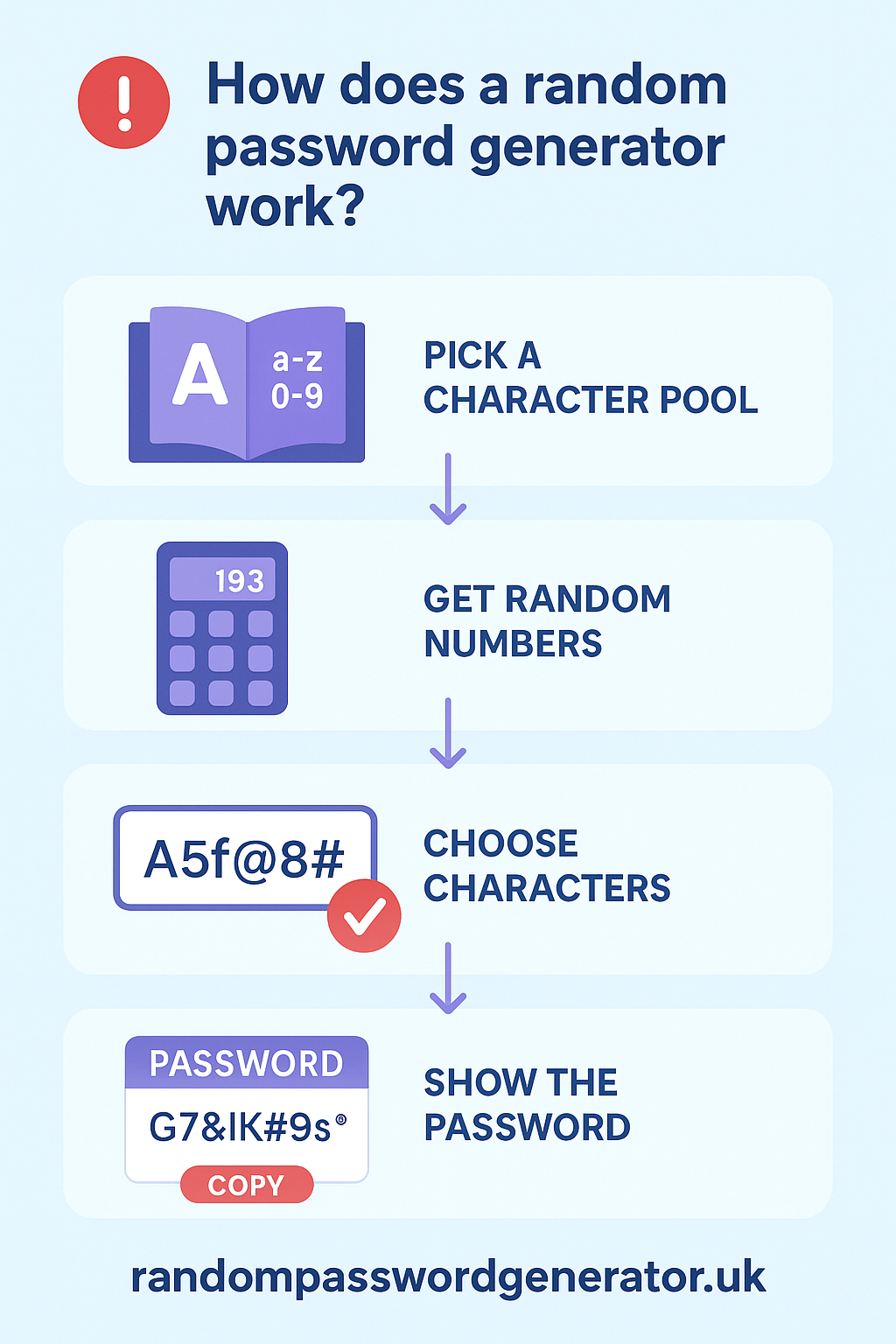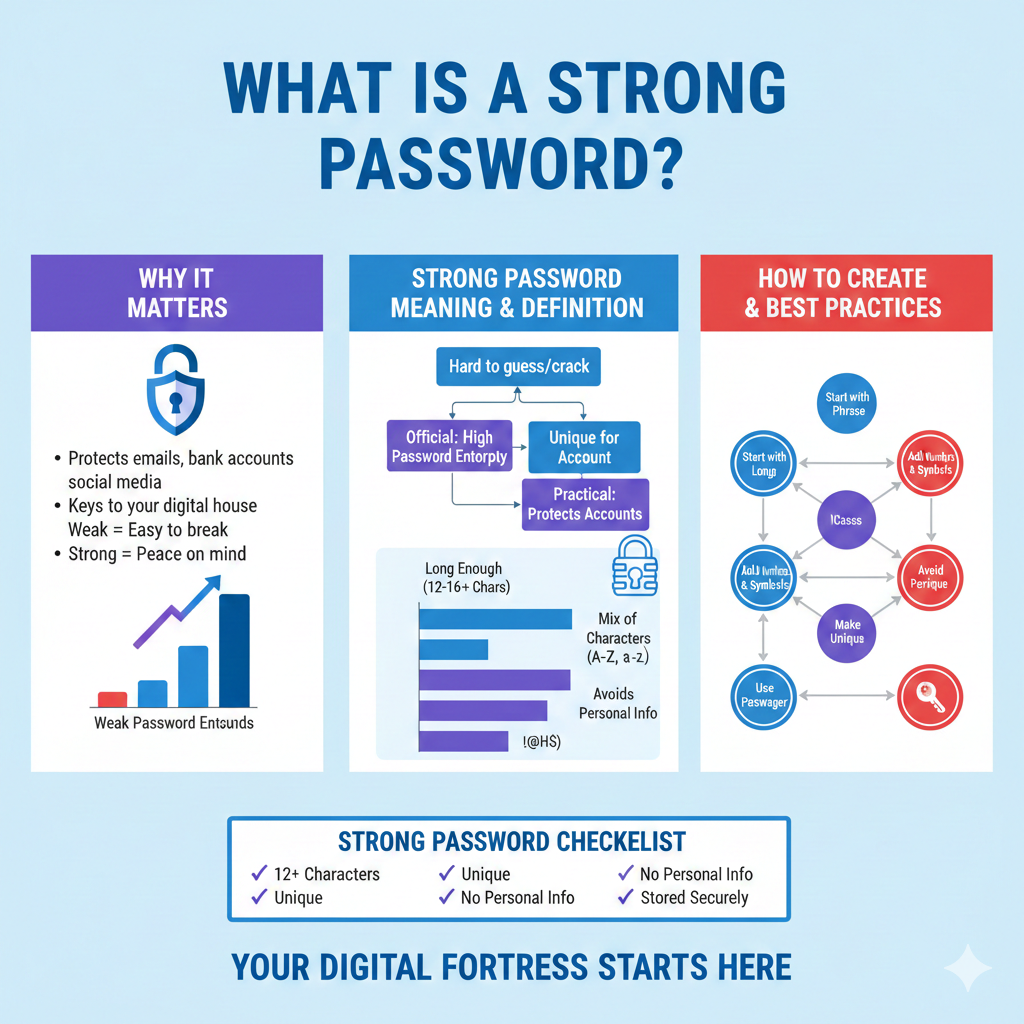Introduction — What this is about
A password generator is a tool that makes strong, random passwords for you. These passwords are hard for people and programs to guess. You do not need to be a tech person to use them. Read on, and you will learn why they help keep your accounts safe and how to use them step by step.
What is a random password generator?
A random password generator is a program or tool that makes a new password by picking letters, numbers, and symbols at random. It does not use words like names or birthdays. Instead, it mixes many characters so the password is hard to guess. You can find these tools online password generator or inside password managers. A password manager is a safe app that stores your passwords for you.
Why use a random password?
People choose easy passwords like pet names, simple words, or 123456. These are easy for hackers to guess. A strong password is long and has many kinds of characters. A random password is much safer because it is not based on a word or a date. If you use a different random password for each site, one hack will not break all your accounts.
Short true story
A friend used the same password for email and social media. That password was his dog’s name and a year. One day, someone guessed his email. Because the same password was on other sites, the thief got into them too. He lost time and money fixing things. If he had used a random secure password for each account and a password manager, this would likely not have happened.
How a random password generator works — simple steps (high level) — random password generator step by step
- Pick a character pool. The tool makes a list: uppercase letters, lowercase letters, numbers, and symbols.
- Get random numbers. The tool uses a math method to make numbers that look random. These numbers pick characters from the list.
- Choose characters. Each random number selects a letter, digit, or symbol from the pool.
- Repeat. The tool repeats the picking until the password is the length you asked for.
- Show the password. The tool gives you the new password. You can copy it and save it in a safe place.
If you want, you can set rules: length, whether to include symbols, or exclude similar characters like 0 and O.
Why randomness matters — password randomness explained
Randomness means there is no pattern. Hackers use lists of common words and patterns to guess passwords. If a password is random and long, it takes too long for hackers. That is why entropy (a technical word for randomness) is important. More letters and symbols mean more entropy and better security.
What is a PRNG? — password generator pseudo-random numbers
Most software uses a PRNG — a pseudo-random number generator. It uses math to make numbers that look random. For most users, PRNGs are safe when they are designed for security. Some systems use special cryptographic random generators that are even safer. These are called CSPRNGs (cryptographically secure pseudo-random number generators).
Step-by-step guide: How to use a random password generator — generate password, password generator tool
- Pick a trusted tool. Use a well-known password manager or a trusted website. Examples include Bitwarden or LastPass.
- Choose length. Pick at least 12 characters. Longer is better — try 16 or more for important accounts.
- Choose character types. Turn on uppercase, lowercase, numbers, and symbols.
- Generate. Click the button to make the password.
- Save it safely. Copy it into a password manager. Do not write it on paper that you can lose.
- Use a unique password for each account. Never reuse the same password across sites.
Common settings and why they matter — password strength, long password generator
- Length: More characters = stronger password.
- Symbols and numbers: Add more variety and make guessing harder.
- Exclude similar characters: This helps if you need to type the password by hand.
- Avoid predictable choices: Do not use words or repeated parts.
How hackers try to break passwords — plain words — password security
Hackers use methods like:
- Dictionary attacks: They try common words and phrases.
- Brute force attacks: They try every possible combination. Longer and random passwords make brute force much slower.
- Credential stuffing: They try passwords stolen from one site on other sites. This is why unique passwords are important.
Passwords vs passphrases — simple choice — complex password, random word password
A passphrase is several random words in a row (for example, the correct horse battery staple is a famous example). Passphrases can be easier to remember and still strong. But a generator that makes a long mix of characters is also very strong. Choose what works for you and use a password manager to store it.
Where randomness can go wrong — simple warnings — random password generator randomness
- Weak random source: If the generator uses a poor random system, the result can be easier to guess. Use trusted tools.
- Saving carelessly: If you store passwords in plain notes or send them in messages, they can be stolen. Use a password manager.
- Reusing passwords: If one site is hacked, reused passwords make the hacker’s job easy.
How to store and manage generated passwords — password builder, password tool
A password manager stores and fills passwords for you. It can also generate passwords. Many let you sync across devices safely. Use a strong master password and, if possible, two-factor authentication (2FA) for the manager account.
Step-by-step: Use a password manager safely — secure password generator explained
- Choose a reputable password manager.
- Set a long, memorable master password. (You can use a passphrase.)
- Enable two-factor authentication.
- Let the manager generate and save unique passwords for each site.
- Backup your recovery code in a safe place.
How to create passwords when you must type them — create a password, a unique password
If you must type a password (no manager allowed), do this:
- Use a long passphrase made of random words.
- Mix in a number or symbol.
- Make it unique to that site by adding a prefix or suffix you only use there.
Still, if typing is frequent, a password manager is the safer choice.
Final simple advice — protect yourself — best password generator, safe password generator
Use a random password generator and a password manager. Make passwords long and unique. Turn on two-factor authentication where possible. These steps make your online life much safer. If you follow these simple rules, you will lower the chance of losing your accounts or money.
FAQs About Random Password Generators
1. What is a random password generator?
A random password generator is a tool that makes strong random passwords using letters, numbers, and symbols.
2. Why should I use a random password instead of my own?
Because your own password is often predictable (like names, dates, or words), a random secure password is harder for hackers to guess.
3. Are online password generators safe?
Yes, if you use a trusted site or app. Many password managers have a built-in password generator.
4. What makes a password strong?
A strong password is long (at least 12 characters) and includes uppercase, lowercase, numbers, and symbols.
5. Can hackers crack a random password?
It is very hard. A long, random strong password could take many years or even centuries to break with brute force.
6. How long should my password be?
At least 12 characters. For sensitive accounts, use 16 or more with a long password generator.
7. Can I remember random passwords?
Usually, no, because they are complex. Use a password manager to save and autofill them.
8. Is a passphrase better than a random string?
Both can be secure. A passphrase (random words) is easier to remember, while a random character password is harder to type but very secure.
9. What is a PRNG in password generators?
PRNG means pseudo-random number generator. It is the math method that helps create random, secure passwords.
10. Should I use the same random password everywhere?
No. Always make a unique password for each account. If one account is hacked, others stay safe.
11. Can I customize a random password?
Yes, a custom password generator lets you set the length and choose letters, numbers, and symbols.
12. Do free password generators work well?
Yes, many free password generators are safe and effective. Just be sure the site is trusted.
13. Is a longer password always better?
Yes. A long password generator makes very strong passwords. Each extra character makes it much harder to crack.
14. Where should I store my random passwords?
Use a password manager tool. Do not write them in notes or plain text files.
15. What is the safest way to create a password?
The safest way is to use a secure random password generator and then store it in a password manager with two-factor authentication.


